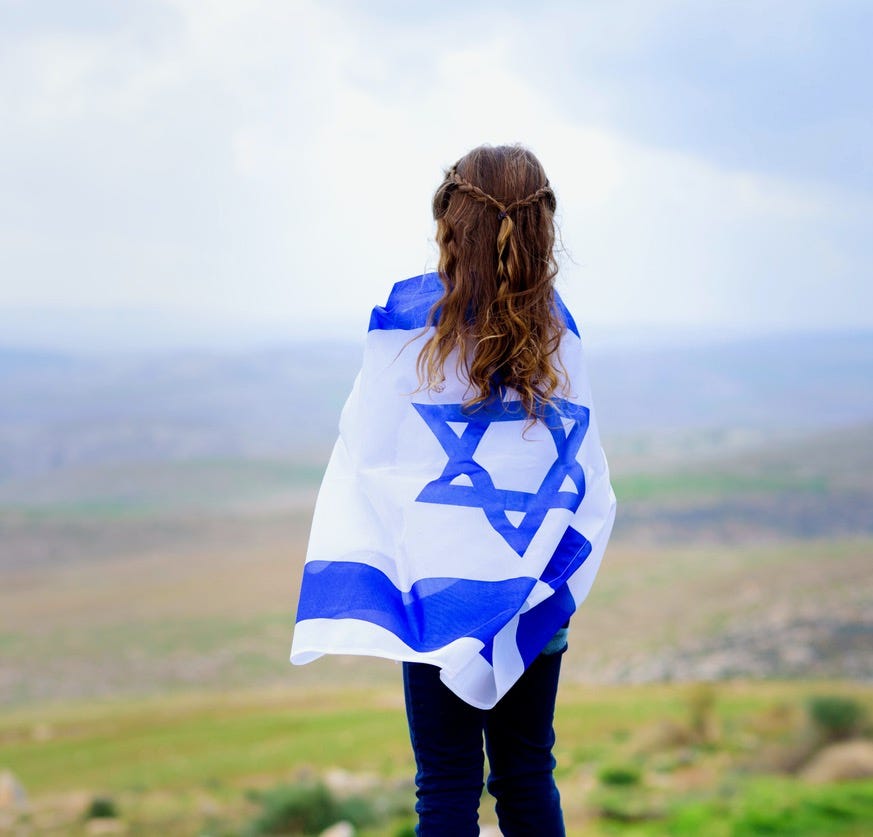The car radio is tuned to the news on NPR. Reports from Israel and Gaza. Two infants hidden by their parents in the family home. Found alive. The parents had been slaughtered by their attackers. Nearby, an 8-year-old’s body discovered in the street. More children dead. Children missing. There are so many tragedies. But it is the children’s stories that burn a hole in your heart.
And as I drive in the afternoon drizzle, through the rearview mirror I see my two-year-old granddaughter’s eyes, silver blue and keenly attentive. The two of us are on our way to a play date, a kids’ indoor play facility with slides and a jumping gym. I know she doesn’t understand what I hear on the radio, but I turn it off anyway. It is too much.
The Middle East—Israel, the Palestinians, Hamas, Iran, Egypt—is a jumble of complexity fueled by ancient hate and religion, all of it emanating ironically from a region seeped in spiritual history that is born out of love. All religious teachings, no matter their origins, are based on nurturing our humanity, caring, understanding. The Bible is full of such teachings. One of the core commandments in The Torah is "love your neighbor as yourself.” The Quran decrees that “whoever kills a soul…is as though he had killed all mankind, and whoever saves a life is as though he had saved all mankind”.
Yet, children are dead. Machine gun fire rains down on a music festival. People are butchered. Evil rises.
Out of the silence inside the car, as I turn into the parking lot of the children’s play facility, trying to shake off the latest news, I ask my granddaughter, “Are you ready to have some fun?” She smiles.
The place is colorful, open, inviting. My granddaughter stands in the large entranceway, her eyes surveying the wonder before her. We sign in. We both get wristbands. The attendant offers a big hello and opens the gate to a number of large rooms filled with toys, climbing structures, a big bouncy gym. She runs to a plastic car designed to look like a giant ladybug and slides inside, her feet reaching for the carpet below to propel her forward. Soon she’s climbing a padded ladder and making her way through a maze of tunnels to a long tube, a big slide. Down she goes. She does it again. Again. Fifteen times in a row.
Watching her, I am filled with joy. Yet, I still hear the news reports in my head. This joy is tainted with hopelessness, bounding back and forth between my granddaughter’s enormous smile and the images those reports have seared into my mind’s eye.
A few other young children are also here. Many the same age as my granddaughter. One little boy, maybe a couple of years older, comes close, maneuvering a two-seated wooden vehicle, fashioned to look like a motorcycle. My granddaughter watches attentively. She’s interested in him, in the vehicle. She looks at me, and then back at the boy. The boy notices her and stops. His eyes on her, and her eyes on him. At first, nothing is said. Then, in the silence, the boy reaches out his hand. For a moment, my granddaughter stands still, unsure. Then, without prompting, she steps forward and climbs onto the second seat of the little motorcycle. She eyes me and smiles as the two children, strangers only moments ago, ride across the padded floor.
The innocence in our shared humanity is innate. Hate is learned. And although the concept of good and evil are social constructs, there is no denying that evil is a manipulation born out of ignorance and assumption. Good that comes naturally, not bad. We can certainly fall blindly into using terms like good and evil. Calling someone good or evil many times ignores the complexities of the human experience. But other times, like the atrocities in Gaza, there is no mistaking evil.
There is also no mistaking hope.
Hope is an act of conscious and unconscious reasoning. It is much more than simply wishful thinking. Hope is not blind optimism. Hope is the human mind striving to survive through the most difficult times. And it involves taking action. Yes, it is innate in the human spirit, but hope gets us nowhere without process. We must act. In our children, hope is pure. It is where it begins. And in their innocence, like the exchange between the little boy and my granddaughter, there are embers of what the world knows is right, beautiful, and real. Sharing, understanding, no judgment. Maybe it’s naive to think that adults can cultivate that inborn hope to change the world.
But what else do we have?
Teach your parents well
Their children's hell will slowly go by
And feed them on your dreams
The one they pick's the one you'll know by
—Graham Nash, “Teach Your Children”
Photo: Hurrah Suhail




